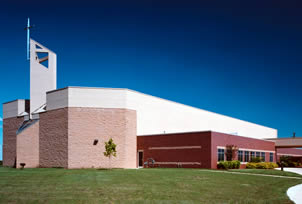Who Is Church For?

For nearly 20 years I have had a question lingering in the back of my mind: Who is church for? It really stems from the "seeker-sensitive" (SS) church movement that has Willow Creek and Saddleback as de facto flagship churches. The basic methodology of the SS movement is to bring seekers of God to church, where they will hear the gospel. And since Sunday morning is the time that most Americans think of when they consider going to church, the Sunday morning services are geared specifically and unabashedly toward seekers. Willow Creek has midweek services geared toward believers; I don't know if Saddleback has a similar setup.
There are a wide range of criticisms of the SS model in general and of these churches in particular, but one is foremost in my mind: that "the church," by definition, is comprised of believers in/followers of Jesus...and therefore, that when we gather as the church, we should gather as believers. In other words, a church service should not be primarily evangelistic.
Here is my quandary: I tend to agree with that from a strictly etymological standpoint, but not from a hermeneutical perspective. In other words, I agree with the dictionary definition of the Greek word for church, but not with the interpretive idea that simply because we don't see a New Testament example of unbelievers coming to "church," we should exclude them from our gatherings. Some people hold to the belief that our methods should align only with what is expressly allowed or clearly demonstrated in the Bible (or, more specifically, the New Testament). Others believe that we are free to do anything that is not expressly forbidden in scripture. I put myself somewhere in the middle, exercising great freedom and latitude in those areas where scripture is either silent or inconclusive. (And, of course, I think that is the best place to be, theologically!)
For now, here are my conclusions: the chief task of the body of Christ (i.e., the church) is to make disciples (Matthew 28:18-20). The first step to becoming a disciple is to answer Jesus' invitation to follow him. Answering that invitation requires hearing it (cf. Romans 10:13-15). And if hearing it means coming to church on Sunday morning, then I say, Move over, Christian, and let the seeker have a seat!
Sidebar: One of my chief concerns with "come-and-hear" methodology is not a watering-down of the gospel that some lament; I don't think that is a valid criticism. Rather, I am concerned that it may tend to downplay the personal responsibility for evangelism; "if I can simply invite my friend to church to hear the gospel, then maybe I don't need to be so well-versed to share the gospel myself". I do not believe that Willow Creek or Saddleback or most other SS churches actively teach this; in fact, I think they actively teach that I am responsible to share my faith. Nonetheless, it can offer an easy escape for someone not inclined to move out of their comfort zone.


4 Comments:
Bill, sounds like your church went through some tough discussions but came through with a very profound - and profoundly simple - answer. I like it. Thanks for sharing.
"The Celtic Way of Evangelism" is on my reading list. I had the incredible opportunity to spend an hour with one of my favorite Christian authors - Calvin Miller - at the National Pastors Convention last year, and that was one of the books he recommended. Now to actually buy it!
3/10/2006 1:31 PM
Randy, thank you for your comment on my blog. Your writing here is very interesting. I love how Sally Morgenthaler raises and answers this question in her book "Worship Evangelism."
Through out Scripture we see that the church is not defined by it's building or location (not that those are bad things of course) but by the people. We also see that their numbers increase by unbelievers seeing the believing community's response to God- their worship. There is tremendous beauty in this because it reminds us where our focus should be.
I wonder how many churches set-up evangelism programs and seeker sensitive services to reach out to their community because, sadly, unbelievers are not drawn to Christ through times of genuine response to God in both worship gatherings and their daily lives. The question of who church is for (if you're calling "church" the time the body gathers to worship together) can be answered simply: God. What this means for His people is that our times of worship together should reflect that. When we plan our worship gatherings, instead of asking "what is the felt need?" perhaps we should ask "how and why do we respond to God? What honors Him?" We should certainly remove what obstacles we can in communicating with those that are seeking even in the midst of our worship gatherings but it will be our authenticity, the evidence of Christ in us that even though foreign (it's not of this world after all) Christ will use to draw unbelievers to him, not a show that removes the mystery and the opportunity for genuine response to our Creator King.
I love your point about evangelism being reduced to "invite your friends to church" instead of a life pattern. I actually believe that evangelism is also a response to an encounter with God.
3/16/2006 4:01 PM
Jessica wrote I actually believe that evangelism is also a response to an encounter with God. I couldn't agree more! Thanks for reading and commenting.
3/17/2006 9:52 AM
It was my pleasure Randy. I'd love for you to visit my blog and give me your thoughts on the relationship between pastors and worship leaders when you get the chance. Have a blessed weekend.
3/17/2006 6:26 PM
Post a Comment
Subscribe to Post Comments [Atom]
<< Home